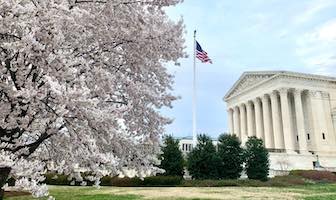By David Singer ——Bio and Archives--December 13, 2020
American Politics, News | CFP Comments | Reader Friendly | Subscribe | Email Us
 The US Supreme Court needs to explain why the doors of its hallowed portals were firmly slammed in Texas and Ohio's faces--without allowing them to at least first tell the Court why it should change its mind.
The Court's reasons for doing so were contained in this brief Order:
The US Supreme Court needs to explain why the doors of its hallowed portals were firmly slammed in Texas and Ohio's faces--without allowing them to at least first tell the Court why it should change its mind.
The Court's reasons for doing so were contained in this brief Order:
The State of Texas's motion for leave to file a bill of complaint is denied for lack of standing under Article III of the Constitution. Texas has not demonstrated a judicially cognizable interest in the manner in which another State conducts its elections. All other pending motions are dismissed as moot. Statement of Justice Alito, with whom Justice Thomas joins: In my view, we do not have discretion to deny the filing of a bill of complaint in a case that falls within our original jurisdiction. See Arizona v. California, 589 U. S. ___ (Feb. 24, 2020) (Thomas, J., dissenting). I would therefore grant the motion to file the bill of complaint but would not grant other relief, and I express no view on any other issue.
"The Presidential Electors Clause provides: "Each State shall appoint, in such Manner as the Legislature thereof may direct, a Number of Electors, equal to the whole Number of Senators and Representatives to which the State may be entitled in the Congress." Art. II, §1, cl.2. Ohio has previously taken the position that this language means what it says.
In a brief filed just last month, it argued that this Clause must be understood as empowering "state legislatures, not state courts, [to] set the rules for picking presidential electors." Republican Party of Pa. v. Boockvar, Nos. 20-542, 20-574, Br. of Amicus Curiae Ohio in Support of Petitioners 3 (Nov. 9, 2020). This means that state courts violate the Constitution when they use judge made doctrines or strained interpretations to change the legislatively fashioned rules governing the manner by which presidential electors are chosen. Id. at 5. The Electors Clause means today what it meant a month ago. Ohio hopes this Court agrees. But either way, the States need this Court to decide, at the earliest available opportunity, the question whether the Electors Clause permits state courts (and state executive officials) to alter the rules by which presidential elections are conducted. The People need an answer, too. Until they get one, elections will continue to be plagued by doubts regarding whether the President was chosen in the constitutionally prescribed manner."Didn't Ohio have standing under Article III of the Constitution and a judicially cognizable interest in asking the Court to clarify the meaning of the word "Legislature" under Art. II, §1, cl.2 of the Constitution? The ramifications of this troubling Supreme Court decision will reverberate for a long time--which the judicial interpretation requested by Ohio could have helped avoid.
View Comments
David Singer is an Australian Lawyer, a Foundation Member of the International Analyst Network and Convenor of Jordan is Palestine International—an organization calling for sovereignty of the West Bank and Gaza to be allocated between Israel and Jordan as the two successor States to the Mandate for Palestine. Previous articles written by him can be found at: jordanispalestine.blogspot.com